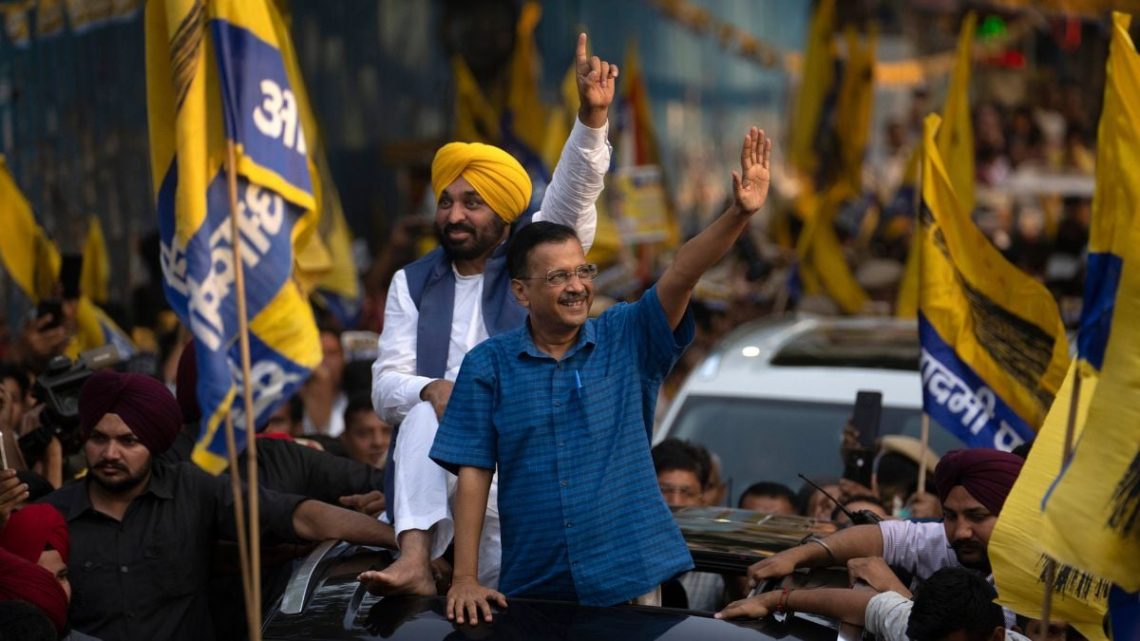The Enforcement Directorate (ED) informed the Delhi High Court on Tuesday that the Aam Aadmi Party (AAP)
will be implicated as a defendant
in the alleged liquor policy scam. This announcement occurred during the central probe agency’s opposition to a plea filed by former Delhi Deputy Chief Minister and AAP leader Manish Sisodia in the money laundering case.
Special counsel Zoheb Hossain, representing the ED, informed Justice Swarana Kanta Sharma that the Aam Aadmi Party will be added as an accused in the case, with a supplementary complaint/chargesheet set to be filed, reported LiveLaw.
Earlier in October last year,
during a hearing for the bail plea
filed by Delhi Deputy Chief Minister Manish Sisodia in the Delhi Excise Policy case, ED informed the Supreme Court of their contemplation to include the AAP as an accused.
Although Sisodia’s bail plea was denied at the time by the Supreme Court, the questions remain: can a political party be indicted in a money laundering case? what does the law say?
To gain clarity, it is imperative to examine the legal provisions pertinent to the case and understand the significance of each entity involved.
What are the laws governing formation of a political party?
Under Article 324 of the Constitution and Section 29A of the Representation of the People Act (RPA), 1951, any association or group of Indian citizens can register as a political party, subject to specified guidelines.
Section 29A mandates that any association intending to avail itself of the provisions for political parties must apply to the Election Commission for registration, providing requisite details regarding its objectives, organisational structure, members, and party funds.
While there is no stipulated minimum membership requirement, prospective parties must have at least 100 members who submit individual affidavits affirming their status as registered electors and non-members of any other registered political party.
So what does section 70 of the PMLA say?
Section 70 of the Prevention of Money Laundering Act (PMLA) stipulates that individuals in charge or responsible within a company at the time of a money laundering offense shall be deemed culpable and subject to prosecution.
Also Read:
Arvind Kejriwal is out of jail. But can he vote, campaign for AAP? Can he fulfil his CM duties?
Moreover, if a company is found in violation of anti-money laundering laws and it is established that such contravention occurred with the consent, connivance, or neglect of its directors, managers, or officers, these individuals are also liable to face charges.
The provision states that, “Where a person committing a contravention of any of the provisions of this Act or of any rule, direction or order made thereunder is a company, every person who, at the time the contravention was committed, was in charge of and was responsible to the company, for the conduct of the business of the company as well as the company, shall be deemed to be guilty of the contravention and shall be liable to be proceeded against and punished accordingly.”
The provision elucidates that a company may be prosecuted independently of individual prosecutions, emphasising the distinction between a company and its members or operators.
Can a political party be considered a ‘company’?
While a political party is not a ‘company’ incorporated under the Companies Act, 2013, the provision has a crucial explanation that could bring a political party under the ambit of the anti-money laundering law, reported Indian Express.
It reads: “Explanation 1[1].–For the purposes of this section (Section 70),–(i) “company” means any body corporate and includes a firm or other association of individuals;”
The phrase ‘association of individuals’ can include a political party. A party, according to Section 29A of the Representation of the People Act, is any association or body of individual citizens of India calling itself a political party.
Has any political party faced PMLA charges before?
To date, no political party has been implicated under India’s anti-money laundering laws, although several NGOs and other organisations have been scrutinised by the ED.
It remains to be seen whether the ED will go through invoking Section 70 of the PMLA against a political party and attribute money laundering offenses accordingly.
What is the Delhi Excise Policy case?
The case stems from allegations of irregularities in the Delhi Excise Policy for 2021-22, with the CBI registering a case on 17 August, 2022, following a complaint by Delhi Lieutenant Governor VK Saxena.
Subsequently, the ED initiated a case related to money laundering on 22 August, 2022, against the accused individuals, including Sisodia and other AAP associates.
Also Read:
How Arvind Kejriwal went from ‘jail to bail’ in 51 days of peak election season
The allegations revolve around a purported criminal conspiracy involving Sisodia and others, including unidentified individuals/entities, during the formulation of the excise policy. It is alleged that government officials colluded to grant liquor licenses in exchange for bribes, exploiting loopholes intentionally left in the policy.
Among those implicated, former AAP communications officer
Vijay Nair has been accused
of orchestrating the scheme, while
Sanjay Singh was arrested
after the ED alleged a monetary transaction linked to the case occurred at his residence.
AAP Arvind Kejriwal was arrested on 21 March after his failure to respond to nine summons issued by the ED, marking a historic event as Kejriwal became the first sitting chief minister in Indian history to be arrested.
However, Kejriwal was granted interim bail by the Supreme Court of India, allowing him to campaign for the 2024 Indian general election. The bail period extends from 10 May, 2024 to 1 June, 2024, with 1 June coinciding with the final day of the elections. Vote counting is scheduled for 4 June, 2024.
Also Read:
Who is Bibhav Kumar, Kejriwal’s sacked aide, who allegedly attacked Swati Maliwal?
With inputs from agencies
Link to article –
ED to make AAP accused in Delhi liquor policy case. Can a political party be charged?
